MercoPress. South Atlantic News Agency
Tag: Central Bank of Brazil
-
Friday, September 25th 2015 - 07:17 UTC
Brazil's Real recovers ground after Central bank promises to use all 'instruments available'
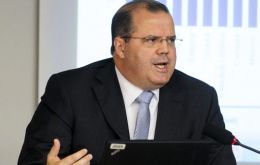
Brazil's depressed currency rebounded Thursday after the head of its central bank vowed to use all instruments in its arsenal to curtail the Real's collapse. Earlier in the day the Real tumbled to an all-time low of 4.248 to the U.S. dollar, but bounced back to 4.023 after central bank President Alexandre Tombini, in an unscheduled press briefing, did not rule out selling part of the country's $371 billion foreign reserves to calm the exchange rate market.
-
Wednesday, September 9th 2015 - 08:10 UTC
No end to Brazil's bad news: two consecutive years of recession ahead
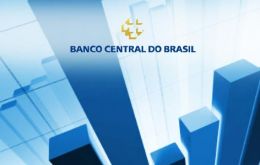
Analysts expect Brazil's economy to contract by 2.44% this year, marking the worst performance since 1990, and inflation will hit 9.29%, the Central Bank said Tuesday. The latest figures represent a downward revision from last week, when analysts expected Latin America's largest economy to contract by 2.26% and inflation to come in at 9.28%.
-
Thursday, September 3rd 2015 - 10:29 UTC
Brazil's central bank leaves basic interest rate unchanged at 14.25%
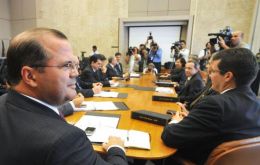
Brazil's central bank halted one of the world's boldest rate-hiking cycles on Wednesday, taking pressure off an economy struggling with recession even amid concerns that a looming budget crisis could stoke inflation.
-
Wednesday, August 26th 2015 - 06:46 UTC
Brazil economy to contract 2.06% and 0.24% next year, says Central bank survey
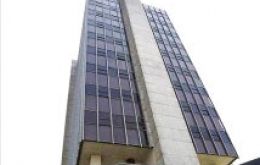
Analysts expect Brazil's economy to contract by 2.06% this year, with the inflation rate coming in at 9.29%, the Central Bank said Monday. GDP estimates come from the Boletin Focus, a weekly Central Bank survey of analysts from about 100 private financial institutions on the state of the national economy.
-
Thursday, August 20th 2015 - 06:32 UTC
Brazil in recession, according to the Central Bank's economic activity index
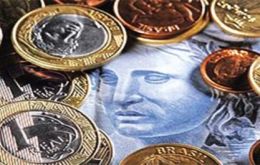
Economic activity in Brazil fell more quickly than expected in June, central bank data showed on Wednesday, adding to evidence that the once-booming economy is suffering a painful recession. The Brazilian central bank's IBC-Br economic activity index fell 0.58% in June from the prior month, the bank said in a report released on Wednesday.
-
Tuesday, August 18th 2015 - 09:15 UTC
Markets estimate Brazil's recession will spill over to 2016, says Central bank
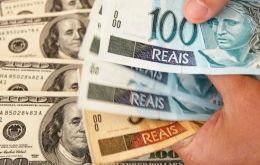
The Brazilian Central Bank weekly Focus Bulletin released on Monday indicates, for the first time, according to the prevailing opinion among financial institutions that the current recession of the country's economy will extend well into 2016. According to Focus the market forecasts a retraction of the Brazil's GDP of 0.15% in 2016.
-
Thursday, June 25th 2015 - 07:33 UTC
Brazilian central bank inflation estimates anticipate increase in interest rates
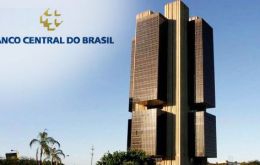
The Brazilian Central Bank on Wednesday raised its inflation estimate for 2015 to 9%, or almost double the midpoint in the official range and well above the 6.5% top end target, and said the economy may contract by 1.1% this year, marking the worst performance since 1990.
-
Friday, May 22nd 2015 - 08:16 UTC
Brazil heading for full recession: economic activity down, unemployment up

Economic activity in Brazil tumbled in the first quarter and unemployment climbed to a near four-year high, adding to signals that a looming recession could worsen as President Dilma Rousseff reins in public spending.
-
Friday, May 8th 2015 - 07:48 UTC
Brazil's central bank to continue increasing rate, with inflation on target at the end of 2016
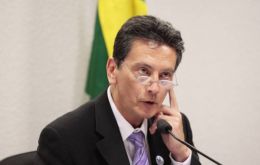
Brazil's central bank expects inflation to run above the official target this year and next, despite months of monetary tightening, signaling policymakers could maintain an aggressive pace of interest-rate hikes to lower stubborn prices. In the minutes of its April 29 rate-setting meeting, the bank said it would remain vigilant to ease persistently high inflation.
-
Thursday, April 30th 2015 - 07:52 UTC
Brazil raises basic rate 50 points to 13.25%, highest since December 2008

As was anticipated and in line with the current anti-inflation policy, Brazil's central bank on Wednesday evening announced the increase of the basic Selic interest rate another 50 points to 13.25% from 12.75%. The decision from the nine-member Monetary Committee was unanimous, according to the official release.
